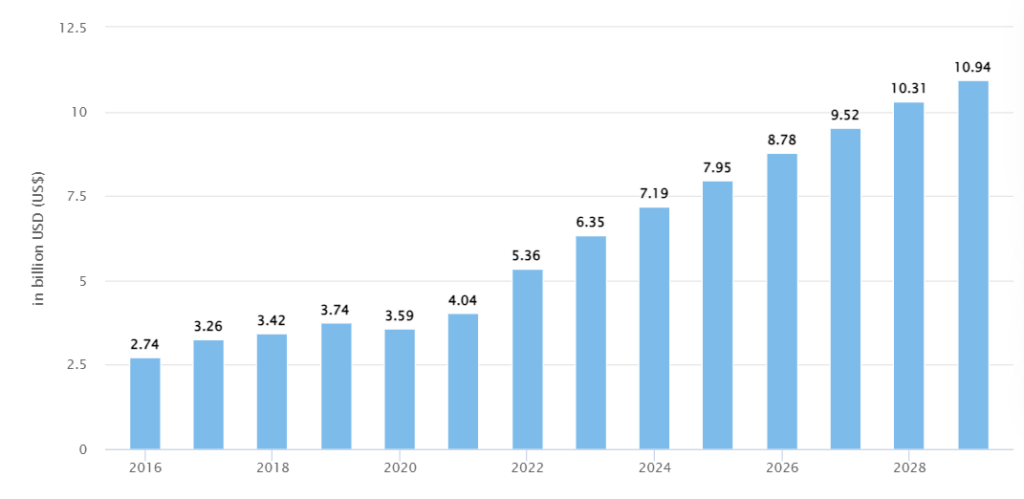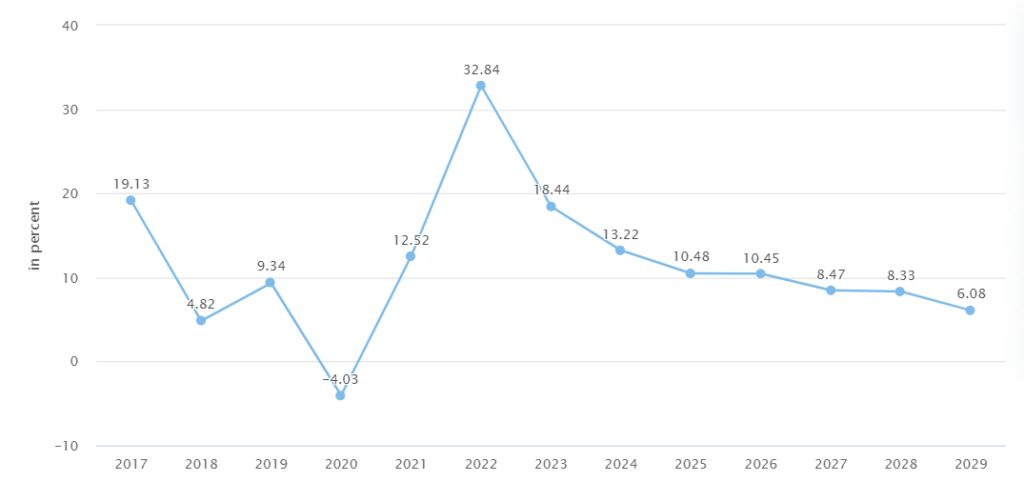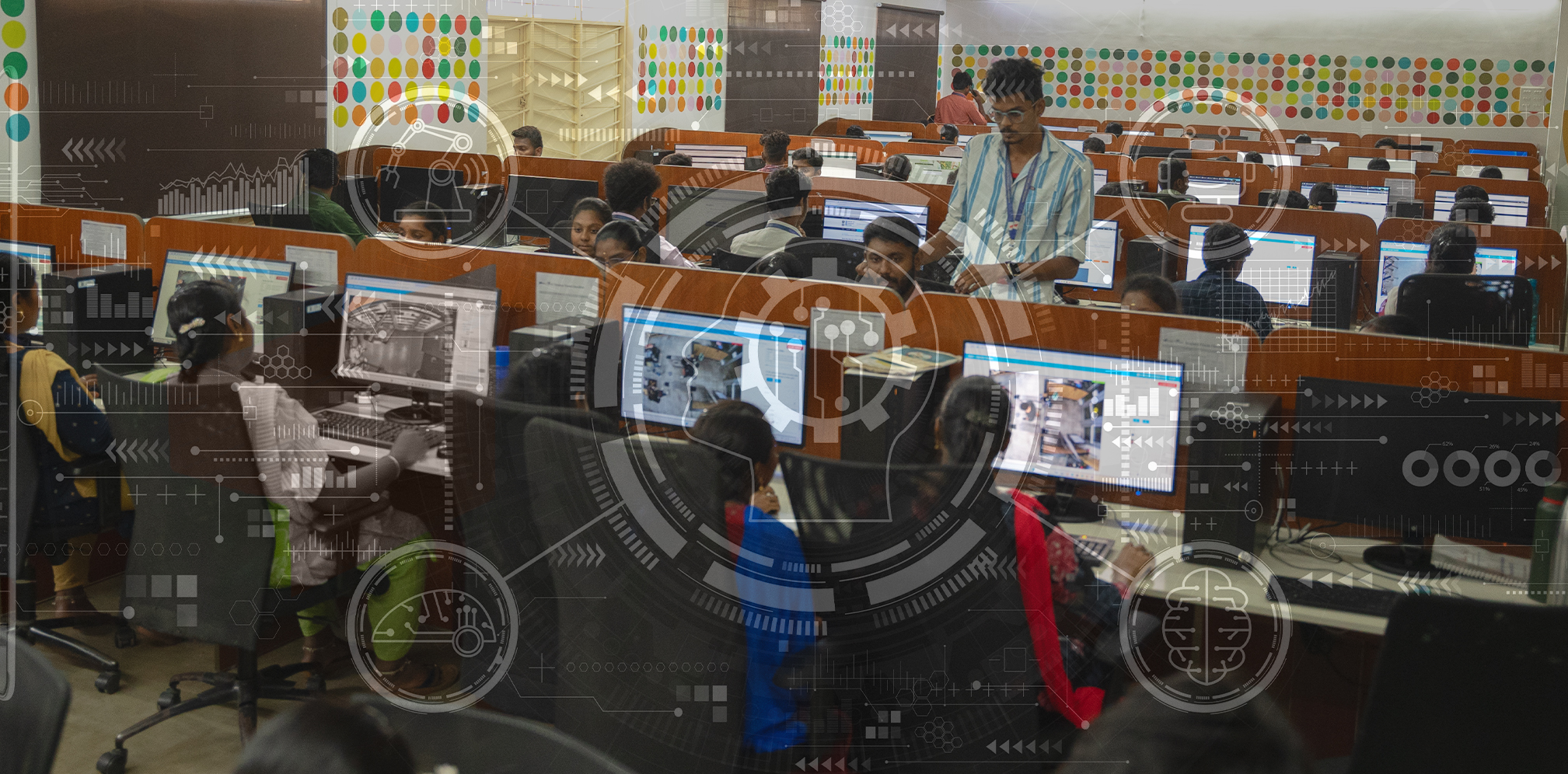In the rapidly evolving technological landscape, AI is having an impact across various industries. One sector that stands on the brink of a significant transformation is India’s Knowledge Process Outsourcing (KPO) and Business Process Outsourcing (BPO) industry.
AI’s ability to streamline operations, reduce costs, and enhance service quality poses a critical question: Will AI replace or disrupt India’s KPO/BPO models?

India has long been a global leader in the KPO and BPO sectors, contributing significantly to the economy. As of 2021, the BPO sector employed over 1.1 million people, according to NASSCOM. In 2025, the BPO market in India is projected to generate revenue of $7.95 billion. Looking ahead, the market is expected to expand at a CAGR of 8.31% from 2025 to 2029, reaching a total market volume of $10.94 billion by 2029 1.
A report by McKinsey indicates that companies integrating AI can potentially increase their cash flow by up to 120% by 2030, through automation of repetitive tasks, improved decision-making, and enhanced customer experiences 2.
India has established itself as a premier destination for BPO/KPO services, driven by several unique features:
Large Pool of Skilled Talent: India boasts a vast reservoir of skilled, English-speaking professionals who are easily trainable crucial for delivering high-quality BPO/KPO services to global clients.
Competitive Labour Costs: India’s labour costs are significantly lower compared to many Western countries. This cost advantage allows businesses to increase profitability.
Conducive Business Environment: The Indian government has implemented several policies to create a business-friendly environment like the Digital India campaign, tax incentives, and simplified regulatory processes to make India an attractive outsourcing destination.
Educational Institutions: India has a large number of educational institutes across the country, producing millions of graduates and postgraduates every year. This continuous influx of educated professionals ensures a steady supply of qualified talent.
Demographic Dividend: India has one of the world’s largest pools of employable individuals aged 18-40. This demographic advantage ensures a constant flow of young, dynamic professionals entering the workforce.

India’s KPO/BPO services operate through various models, including onshore, offshore, and nearshore outsourcing to provide services such as:
- Customer Support: Services include chatbots, sentiment analysis, predictive analytics, and more.
- Data Management: Includes automated data entry, data validation, data analytics, and more.
- IT Services: Covers network monitoring, automated testing, cybersecurity, and more.
- Finance and Accounting: Encompasses bookkeeping, fraud detection, financial forecasting, and more.
- HR Services: Involves resume screening, employee engagement, talent acquisition, and more.
The adaptability and comprehensive service offerings have made India a preferred outsourcing destination worldwide.
AI is revolutionising the BPO/KPO industry, creating new job roles and services. These include data science, digital marketing, AI-powered analytics, AI chatbots and virtual assistants, AI ethics and compliance, system development and maintenance, HR and recruitment, and so on. The Indian KPO/BPO sector needs to embrace AI and leverage its potential . This will require significant investments in AI research and development, upskilling the workforce, and fostering a collaborative ecosystem between businesses, academia, and the government
AI’s Transformative Potential and Key Challenges
AI holds transformative potential for the KPO/BPO industry. It can significantly enhance efficiency by automating repetitive tasks, thus streamlining processes and reducing operational costs. AI-driven systems can improve accuracy, minimize human errors and elevate service quality. Moreover, AI allows for scalability, enabling firms to handle larger volumes of work seamlessly.
A variety of AI technologies are relevant to KPO/BPO:
- Robotic Process Automation (RPA): RPA involves using software bots to automate routine and repetitive tasks. For instance, UiPath and Automation Anywhere have successfully implemented RPA in several BPO operations, resulting in increased efficiency and reduced operational costs. RPA adoption rates have surged, with numerous success stories highlighting its benefits.
- Natural Language Processing (NLP): NLP plays a crucial role in customer support and data management. AI-driven chatbots and virtual assistants powered by NLP, such as those developed by Haptik and Yellow.ai, have transformed customer interaction by providing instant, accurate responses. These implementations have not only enhanced customer satisfaction but also improved operational efficiency. The advancements in NLP continue to promise better and more intuitive AI systems for the future.
- Machine Learning: ML applications in KPO/BPO include data analysis, predictive analytics, and decision-making processes. Companies utilize machine learning to deliver personalized services and improve service delivery. These technologies enable the analysis of large datasets, offering valuable insights and enhancing decision-making capabilities.

AI adoption in the KPO/BPO sector presents several challenges despite its benefits:
- Job Displacement: AI’s ability to perform tasks traditionally done by humans raises concerns of job loss.
- Workforce Adaptation: Extensive reskilling and upskilling are required to adapt the workforce to new roles.
- Ethical Concerns: Issues like bias, transparency, and accountability in AI systems need addressing.
- Integration Hurdles: Challenges include the cost of implementation, existing infrastructure compatibility, and resistance to change.
Addressing Fears, Exploring Opportunities, and Strategic Recommendations
To mitigate the fear of job displacement, companies should focus on reskilling and upskilling their workforce. Developing new roles that complement AI systems is crucial. Ethical concerns can be addressed by establishing clear guidelines and governance frameworks, ensuring transparency and accountability in AI applications.
AI also presents new job roles and opportunities, such as AI trainers, data analysts, and cybersecurity experts. Enhancing human-AI collaboration can lead to better outcomes, leveraging the strengths of both humans and machines.
Several Indian companies have successfully integrated AI into their operations. For example, NextWealth has implemented AI-driven automation to enhance data processing and customer support, improving efficiency and customer satisfaction. Their strategic approach involves continuous learning and adapting AI technologies to meet evolving client needs.
Another example is Singularium Technologies, which has launched an AI-powered platform called STEPZERO transforming ITeS, KPO, and BPO operations. The platform offers advanced workstation design, flexible workflow management, integrated gig economy access, and robust quality control mechanisms. This has resulted in a 10x speed increase and 60% cost savings for their clients 3. Meanwhile, Acquire BPO has successfully implemented AI-powered chatbots for customer support that handle 85% of customer service interactions, providing instant responses, reducing operational costs, and offering 24/7 availability 4.

The Role of C-Level Executives
In the rapidly evolving landscape of AI, C-Level executives in India’s KPO/BPO sector play a critical role in ensuring successful AI adoption and transformation. Strong leadership is crucial for navigating this change and maximising the potential benefits of AI adoption.
C-level executives must create a clear vision for AI-driven transformation and communicate its benefits across the organization, highlighting the benefits of AI for both the organization and its employees. Managing the transition to AI involves effective communication, comprehensive training programs, and providing employee support.
Key decision-makers should:
- Embrace AI: Highlighting the importance of adopting AI technologies, executives should actively drive AI initiatives within their organizations. This can involve setting clear goals, allocating resources, and establishing pilot projects to demonstrate the value of AI. CTOs and C-Level executives should embrace AI by fostering a culture of innovation and adaptability. Investing in talent through continuous learning and development programs is essential. Building strong AI-human teams and encouraging collaboration will help drive successful AI integration.
- Invest in Talent: Encouraging investments in training and development will ensure the workforce has the necessary skills to thrive in an AI-driven environment. Upskilling programs can be implemented in data analysis, machine learning, and AI-powered tools specifically tailored for KPO/BPO operations. Addressing concerns about job displacement through effective communication and reskilling initiatives is also important if not critical.
- Foster Innovation: Promoting a culture of continuous improvement and innovation will help organizations stay competitive and adaptive to technological advancements. This can involve encouraging experimentation, rewarding innovative ideas, and so on.
In summary, Will AI Replace or Disrupt India’s KPO/BPO Models?
While some entry-level roles, many lower-end jobs, particularly in call centers and basic operations, will be displaced and disrupted, this also presents opportunities for higher-value roles and skill enhancement. Companies and workers who adapt and investing in AI-driven skill enhancement, deploying ‘human in the loop’ models AI technologies will thrive in the long run and generate higher-value jobs and drive revenue growth.
While AI presents challenges and opportunities for India’s KPO/BPO industry, its potential to transform and enhance operations is undeniable. By addressing fears, exploring opportunities, and strategically integrating AI, the industry can continue to thrive. Proactive steps towards AI adoption will ensure future success and maintain India’s position as a global KPO/BPO sector leader.
1 – https://www.statista.com/outlook/tmo/it-services/business-process-outsourcing/india
4 – https://www.arsturn.com/blog/innovative-use-cases-of-ai-in-bpo-industry-automation
Callouts:
Economic Contribution: India has long been a global leader in the KPO and BPO sectors, contributing significantly to the economy. As of 2021, the BPO sector employed over 1.1 million people, according to NASSCOM.
Market Projections: In 2025, the BPO market in India is projected to generate revenue of $7.95 billion. Looking ahead, the market is expected to expand at a CAGR of 8.31% from 2025 to 2029, reaching a total market volume of $10.94 billion by 2029.
AI’s Financial Impact: A report by McKinsey indicates that companies integrating AI can potentially increase their cash flow by up to 120% by 2030, through automation of repetitive tasks, improved decision-making, and enhanced customer experiences.
Demographic Dividend: India has one of the world’s largest pools of employable individuals aged 18-40. This demographic advantage ensures a constant flow of young, dynamic professionals entering the workforce.

